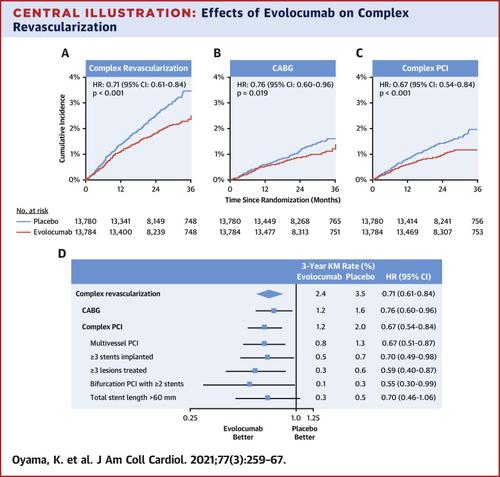当前位置:
X-MOL 学术
›
J. Am. Coll. Cardiol.
›
论文详情
Our official English website, www.x-mol.net, welcomes your feedback! (Note: you will need to create a separate account there.)
Effect of Evolocumab on Complex Coronary Disease Requiring Revascularization
Journal of the American College of Cardiology ( IF 21.7 ) Pub Date : 2021-01-01 , DOI: 10.1016/j.jacc.2020.11.011 Kazuma Oyama 1 , Remo H M Furtado 2 , Antonio Fagundes 3 , Thomas A Zelniker 4 , Minao Tang 3 , Julia Kuder 3 , Sabina A Murphy 3 , Andrew Hamer 5 , Huei Wang 5 , Anthony C Keech 6 , Robert P Giugliano 3 , Marc S Sabatine 3 , Brian A Bergmark 3
Journal of the American College of Cardiology ( IF 21.7 ) Pub Date : 2021-01-01 , DOI: 10.1016/j.jacc.2020.11.011 Kazuma Oyama 1 , Remo H M Furtado 2 , Antonio Fagundes 3 , Thomas A Zelniker 4 , Minao Tang 3 , Julia Kuder 3 , Sabina A Murphy 3 , Andrew Hamer 5 , Huei Wang 5 , Anthony C Keech 6 , Robert P Giugliano 3 , Marc S Sabatine 3 , Brian A Bergmark 3
Affiliation

|
BACKGROUND
Proprotein convertase subtilisin/kexin type 9 (PCSK9) inhibitors induce plaque regression and reduce the risk of coronary revascularization overall. OBJECTIVES
To evaluate the ability of PCSK9 inhibitors to reduce the risk of complex coronary atherosclerosis requiring revascularization. METHODS
FOURIER was a randomized trial of the PCSK9 inhibitor evolocumab vs. placebo in 27,564 patients with stable atherosclerosis on statin therapy followed for a median of 2.2 years. Clinical documentation of revascularization events was blindly reviewed to assess coronary anatomy and procedural characteristics. Complex revascularization was the composite of complex percutaneous coronary intervention (PCI) (as per previous analyses, >1 of: multivessel PCI, ≥3 stents, ≥3 lesions treated, bifurcation PCI, or total stent length >60 mm) or coronary artery bypass grafting surgery (CABG). RESULTS
1,724 patients underwent coronary revascularization, including 1482 who underwent PCI, 296 who underwent CABG, and 54 both. Complex revascularization was performed in 632 (37%) patients. Evolocumab reduced the risk of any coronary revascularization by 22% (HR 0.78 [0.71-0.86]; P<0.001), simple PCI by 22% (HR 0.78, [0.70-0.88]; P<0.001), complex PCI by 33% (HR 0.67 [0.54-0.84]; P<0.001), CABG by 24% (HR 0.76 [0.60-0.96]; P=0.019), and complex revascularization by 29% (HR 0.71 [0.61-0.84]; P<0.001). The magnitude of the risk reduction with evolocumab in complex revascularization tended to increase over time (20%, 36%, and 41% risk reductions in 1st, 2nd and beyond 2nd year). CONCLUSIONS
Adding evolocumab to statin therapy significantly reduced the risk of developing complex coronary disease requiring revascularization, including complex PCI and CABG individually.
中文翻译:

Evolocumab对需要血运重建的复杂冠心病的影响
背景前蛋白转化酶枯草杆菌蛋白酶/可欣9 (PCSK9) 抑制剂诱导斑块消退并降低冠状动脉血运重建的总体风险。目的 评估 PCSK9 抑制剂降低需要血运重建的复杂冠状动脉粥样硬化风险的能力。方法 FOURIER 是一项随机试验,对 27,564 名接受他汀类药物治疗的稳定动脉粥样硬化患者进行了 PCSK9 抑制剂 evolocumab 与安慰剂的比较,中位时间为 2.2 年。对血运重建事件的临床记录进行盲目审查,以评估冠状动脉解剖结构和手术特征。复杂血运重建是复杂经皮冠状动脉介入治疗 (PCI) 的复合(根据之前的分析,>1 个:多支血管 PCI、≥3 个支架、≥3 个治疗病变、分叉 PCI 或总支架长度 > 60 毫米)或冠状动脉旁路移植手术 (CABG)。结果 1,724 名患者接受了冠状动脉血运重建,其中 1482 名接受了 PCI,296 名接受了 CABG,54 名同时接受了两者。632 名 (37%) 患者进行了复杂的血运重建。Evolocumab 将任何冠状动脉血运重建的风险降低 22%(HR 0.78 [0.71-0.86];P<0.001),简单 PCI 降低 22%(HR 0.78,[0.70-0.88];P<0.001),复杂 PCI 降低 33% (HR 0.67 [0.54-0.84];P<0.001),CABG 增加 24%(HR 0.76 [0.60-0.96];P=0.019),复杂血运重建增加 29%(HR 0.71 [0.61-0.80];P<0.0) )。随着时间的推移,evolocumab 在复杂血运重建中的风险降低幅度趋于增加(第 1、2 年和第 2 年之后的风险降低 20%、36% 和 41%)。
更新日期:2021-01-01
中文翻译:

Evolocumab对需要血运重建的复杂冠心病的影响
背景前蛋白转化酶枯草杆菌蛋白酶/可欣9 (PCSK9) 抑制剂诱导斑块消退并降低冠状动脉血运重建的总体风险。目的 评估 PCSK9 抑制剂降低需要血运重建的复杂冠状动脉粥样硬化风险的能力。方法 FOURIER 是一项随机试验,对 27,564 名接受他汀类药物治疗的稳定动脉粥样硬化患者进行了 PCSK9 抑制剂 evolocumab 与安慰剂的比较,中位时间为 2.2 年。对血运重建事件的临床记录进行盲目审查,以评估冠状动脉解剖结构和手术特征。复杂血运重建是复杂经皮冠状动脉介入治疗 (PCI) 的复合(根据之前的分析,>1 个:多支血管 PCI、≥3 个支架、≥3 个治疗病变、分叉 PCI 或总支架长度 > 60 毫米)或冠状动脉旁路移植手术 (CABG)。结果 1,724 名患者接受了冠状动脉血运重建,其中 1482 名接受了 PCI,296 名接受了 CABG,54 名同时接受了两者。632 名 (37%) 患者进行了复杂的血运重建。Evolocumab 将任何冠状动脉血运重建的风险降低 22%(HR 0.78 [0.71-0.86];P<0.001),简单 PCI 降低 22%(HR 0.78,[0.70-0.88];P<0.001),复杂 PCI 降低 33% (HR 0.67 [0.54-0.84];P<0.001),CABG 增加 24%(HR 0.76 [0.60-0.96];P=0.019),复杂血运重建增加 29%(HR 0.71 [0.61-0.80];P<0.0) )。随着时间的推移,evolocumab 在复杂血运重建中的风险降低幅度趋于增加(第 1、2 年和第 2 年之后的风险降低 20%、36% 和 41%)。











































 京公网安备 11010802027423号
京公网安备 11010802027423号